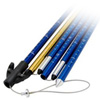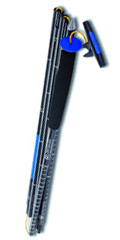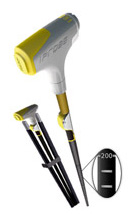 Choosing an avalanche probe should be much easier than choosing an avalanche beacon. There are more manufacturers but there is less things to seriously consider. And even if you make a mistake it will likely cost you only about $60.
Choosing an avalanche probe should be much easier than choosing an avalanche beacon. There are more manufacturers but there is less things to seriously consider. And even if you make a mistake it will likely cost you only about $60.
Shopping for an avalanche probe: things to consider
There are pretty much only three things to consider when shopping for an avalanche probe:
- Length
- Material it is made of
- Assembly system
Length
There are couple of usual (standard) lengths that avalanche probes come in – 200cm, 240cm, and 320cm. Recently, some less common lengths have been on the market but might prove more favorite in the longer run – 220cm, 260cm, and 280cm.
Most of the probes have 40 cm long segments that’s why the standard lengths are the way they are. Probes of other lengths have usually longer segments which some times might cause trouble with fitting it in a back pack.
When choosing a probe consider whether you live in a climate with heavy snow fall (e.g. West Coast, Alaska). If yes, then you should definitely buy a probe that is longer than 240 cm.
If you mostly move around Rockies than 240 cm probe should be enough. But generally, the longer the better if you don’t mind carrying couple of extra grams.
When buying a new avalanche probe also consider whether you might be traveling to some snowier parts of the world than the one you live in.
Material
 Majority of avalanche probes, like shovels, are made out of aluminum but as with everything carbon is claiming its share within the avalanche probes market too.
Majority of avalanche probes, like shovels, are made out of aluminum but as with everything carbon is claiming its share within the avalanche probes market too.
The main difference between aluminum and carbon probes is weight, with the later being quite a bit lighter when comparing the same lengths.
On the other hand aluminum is more suitable for “daily” users and is less likely to break. It might bend but most likely it won’t break.
So in general, aluminum probes are more durable, however, today’s carbon probes are very durable as well.
Assembly system
This is a feature of avalanche probes no one really compares. It might be due to a fact that it simply depends on an individual user or whether he or she is already used to one of the existing systems, thus has preferences.
The most efficient probe assembly systems come from brands such as Ortovox, Backcountry Access and Pieps (on their iProbe). They all share the common goal that you can assemble some of their probe models lightning fast, or in about 3 seconds. That is a huge time saver compare to the traditional assembly systems.
Since all of the fast assembly systems work quite well the best thing you can do is ask your friends whether they have experience with couple of them and which one they prefer. Or try a couple of them yourself and decide.
Pieps iProbe – very unique avalanche probe
 This avalanche probe deserves a special section because it is unlike any other. It comes in two lengths which may actually seem short (220 cm and 260 cm). However, the probe’s biggest advantage comes from its beacon-like capabilities.
This avalanche probe deserves a special section because it is unlike any other. It comes in two lengths which may actually seem short (220 cm and 260 cm). However, the probe’s biggest advantage comes from its beacon-like capabilities.
Pieps iProbe uses a battery and beeps when you are close to a buried beacon (victim). This makes pin-point search much simpler and faster, the feedback is instant.
The iProbe can also turn off a Pieps beacon with a push of a button on the handle of the iProbe. This helps in multiple burial scenarios. It can also reactivate it.
The probe is compatible for searching any avalanche beacon on the market and it will beep, but it is able to communicate (switch on/off) with the Pieps beacons only.
Potential downside of this probe might be its cost, which is usually around $200. However, the benefits are worth buying it and this is the way avalanche probes might be going in the future.
